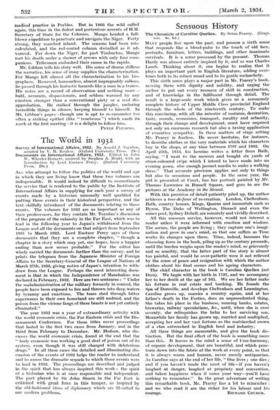Sensuous History
MANY people live upon the past, and possess a sixth sense that responds like a blood-pulse to the touch of old lace,
portraits, furniture, letters, buildings, and other inanimate survivals. It is a sense possessed by the peasant. Thomas Hardy was almost entirely inspired by it, and so was Charles Lamb. Thinking about it, one begins to realize that it plays an important part in English literature, adding over- tones both to its robust mood and to its gentle melancholy.
This sixth sense plays a major part in Mr. Peacey's book, riming there with dignity and nobility, and urging the author to put out every resource of skill in construction, and of knowledge in the fulfilment through detail. The result is a large-scale work which gives us a sensuously complete history of Upper Middle Class provincial England through the whole of the nineteenth century. To make this convincing, with all the-ininutice of costume, decoration, taste, morals, economics,`: transport, rurality and urbanity, through their change and development, must have required not only an enormous research but also a taxing application of evocative sympathy. In these matters of stage setting Mr. Peacey is fearless. He never hesitates, for instance, to describe clothes or the very materials which his characters buy in the shops, at any time between 1797 and 1902. On April 25th, 1813, his heroine writes a letter from Bath, saying, " I went to the mercers and bought six yards of straw-coloured crepe which I intend to have made into an evening gown, also enough jaconet muslin to make a walling dress." That accurate precision applies not only to things but also to occasions and people. In the same year, the girl is presented at Court, has her portrait painted by Mr. Thomas Lawrence in Russell Square, and goes to see the pictures at the Academy in the Strand.
With this precision of detail patiently piled up, the author achieves a tour-de-force of re-creation. London, Cheltenham, Bath, country houses, Kings, Queens and immortals such as Byron, The Duke of Wellington, Disraeli and even the miner poet, Sydney Dobell, are minutely and vividly described. All this museum service, however, would not interest a reader unless it were informed with emotion and wisdom.
The scenes, the people are living ; they capture one's imagi- nation and grow in one's mind, so that one suffers as Time works its changes upon them. Time, indeed, becomes the obsessing force in the book, piling up as the century proceeds,
until the burden weighs upon the reader's mind, so grievously and so sensibly, that the latter. part of the story is almost
too painful, and would be over-pathetic were it not relieved by the sense of peace and resignation with which the author clothes about his final scenes and his ageing characters.
The chief character in the book is Caroline Quellen (nee Dom). We begin with her birth in 1797, and we accompany her to her death at the age of 105. We see her father make his fortune in real estate and banking. He founds the Spa of Domville, and develops Cheltenham and Leamington. Caroline grows up, marries a country squire, and at her father's death in the Forties, does an unprecedented thing. She takes his place in the business, running banks, estates, breweries, railway speculations, &c., until, when she is over seventy, she relinquishes the helm to her surviving son. Meanwhile her family has grown up, married and multiplied, accepting her and her vast fortune as the matriarchal crown of a clan entrenched in English land and industry.
MI these things are memorable, and give the book dis- tinction. But the final effect of the book is something more than this. It leaves in the mind a sense of tame-harmony, of organic development, that are beautiful, and which pene- trate, down into the fabric of the work at every point, so that it is always warm and human, never merely antiquarian. As Caroline says at the end of her life, " One lives ; one dies ; and if yOu haven't made the most of life—if you haven't laughed- at danger, laughed at propriety and convention, and 'taken happiness when it came your way—you'll have nothing to remember." In the great adventure of writing this remarkable book, Mr. Peacey has a lot to remember : and we who read it are the richer for his labour and his




























































 Previous page
Previous page